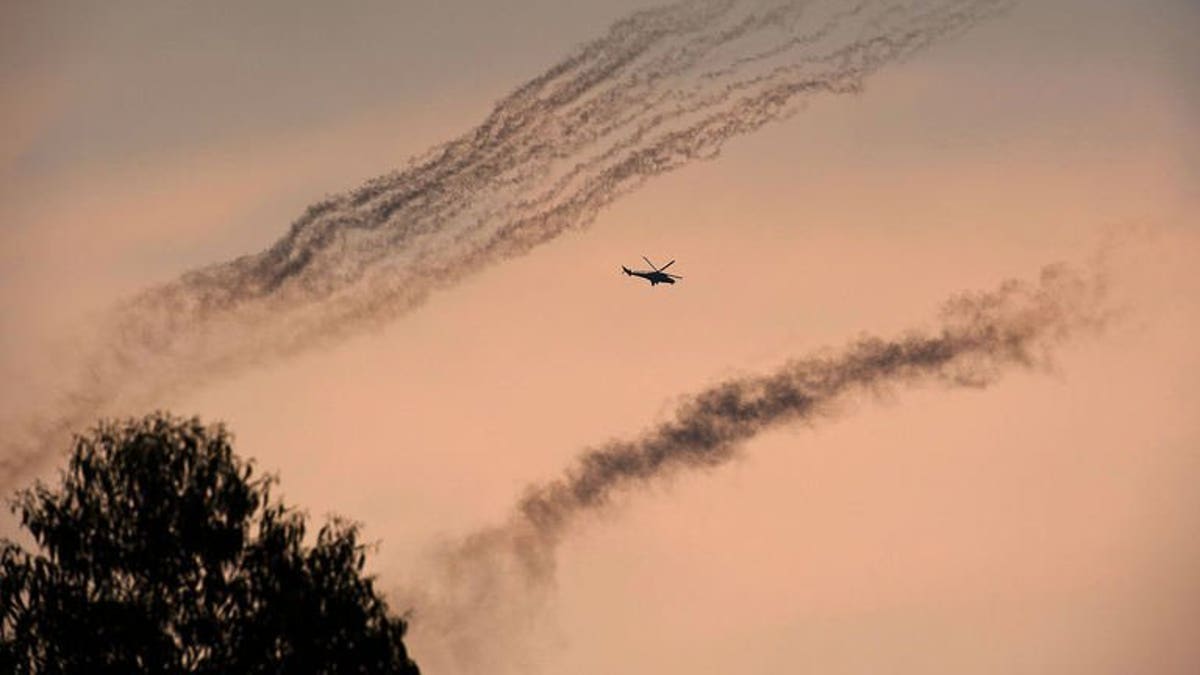
A Congolese army helicopter flies amidst smoke from rockets fired at M23 positions north of Goma in the east of the Democratic Republic of the Congo on July 17, 2013. Three Congolese army helicopters on Tuesday blasted positions of the rebel M23 movement near the eastern Democratic Republic of Gongo (DRC) provincial capital of Goma. (AFP/File)
GOMA, DR Congo (AFP) – Three Congolese army helicopters fired on M23 rebel positions near the eastern Democratic Republic of Congo (DRC) provincial capital of Goma on Tuesday.
"Our helicopters have just bombarded enemy positions," a Congolese officer told AFP journalists on the frontline after they witnessed the attack.
"Until now the enemy has not yet responded," he added.
The attacks came on the same day as the trial opened in Goma of a soldier and policeman accused of mutilating the corpse of an M23 rebel after clashes last week.
Meanwhile Human Rights Watch (HRW) accused Rwanda of continuing its support of the M23 in a report. It also accused the rebels of summary executions and rape.
The M23 movement said Monday it was only four kilometres (2.5 miles) from Goma, although it stressed its aim was to force the government to negotiate rather than to take the city.
The M23 occupied Goma, the capital of North Kivu province, for 10 days in November before withdrawing from the city following international pressure and in return for a dialogue with Kinshasa, which began in the Ugandan capital Kampala, in December.
But after a truce of around two months, the army and the M23 resumed fighting on July 14. According to the United Nations, the fighting has caused 4,200 people to flee their homes.
Meanwhile the Goma trial of the soldier and policeman got underway with the pair facing allegations made following heavy fighting between the army and the rebels last week.
"There is a soldier and a policeman appearing. They are accused of mutilating the body of an M23 rebel," Lieutenant Colonel Olivier Hamuli, an army military spokesman who attended the trial, told AFP.
The hearing follows comments made by the head of the UN, Ban Ki-moon, who said he was "deeply concerned" by the mistreatment of M23 rebels.
The issue had also been raised by the UN at the highest levels of government in the DRC.
The governor of North Kivu, Julien Paluku, welcomed the trial, saying that "desecrating corpses" is against international law.
But at the same time he called for the "deployment of Office of the ICC (International Criminal Court) to investigate the crimes committed" in eastern DRC against the Congolese.
The trial was later adjourned until Thursday to allow the accused to "better prepare their defences", said the military spokesman.
The M23 has been active since May 2012 in the mineral-rich province of North Kivu. It is mainly composed of Congolese Tutsi who were integrated into the army following a 2000 peace accord. They mutinied in April 2012 saying the accord was never fully respected.
Kinshasa and the United Nations have accused Rwanda and Uganda of supporting the M23, drawing denials from the RDC's two neighbouring countries.
However, HRW said Rwanda was indeed supporting the rebels and accused them of grave abuses.
"Residents of the region and rebel deserters have described recent work showing that the criminal forces of M23 have received support from Rwanda," HRW wrote in its report.
"These activities include regular movements of Rwanda to the DRC of uniformed men of the Rwandan army and the supply of M23 ammunition, food and other supplies from Rwanda."
It also said that rebels had carried out 44 summary executions and raped 61 women and girls since March.
HRW said they had conducted 100 interviews, including with victims on the Congolese/Rwandan border.
However, HRW corrected a claim in the report that Rwandan soldiers had served with the peacekeeping forces in Somalia and Darfur. Rwandan forces had only served in Darfur.
Yolande Makolo, a spokeswoman for the Rwanda presidency, said: "There's nothing new in the HRW report except their false testimony from 'deserters' who claimed they were RDF (Rwandan Defence Forces) peacekeepers in Somalia.
"This proves that HRW will stop at nothing to damage Rwanda."
